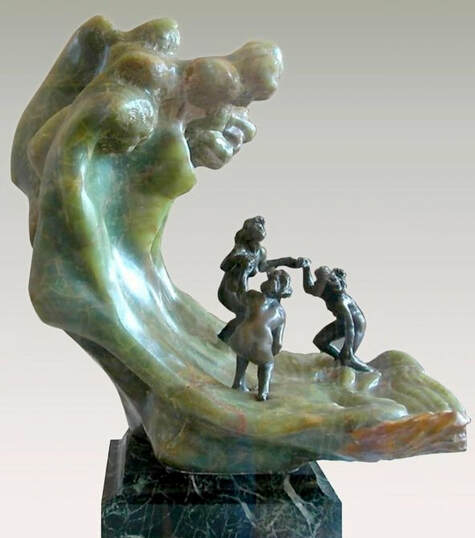|
Claudel's Wave of Madness Paul Claudel, the brother of French artist Camille Claudel, had her committed to a mental institution in 1913, just after their father’s death. Although her forms indicated that she had been voluntarily admitted, they were signed by a doctor and Paul. Prior to her incarceration, she destroyed many of her sculptures in psychotic fits. Only about ninety remained by the time she was hospitalized. Perhaps she pictured them living on after she had smashed them. Did she feel their cold reproaches could no longer hurt her? Or did they still mock her, freeing themselves from the monolith of night and shambling toward her bed, their derision a crack in marble only she could see? One work that she spared was La Vague. La Vague was a departure for Claudel, so it’s fitting that it told of a wave, a change about to move water and land as one. Made of bronze and onyx marble, it was more delicate than what had come before. I wonder if critics were comforted when they saw it, thinking that the aging spinster had swapped her lurid embraces for decorative arts, as was proper. But Claudel had seen woodblock prints by the Japanese artist Hokusai and been inspired. In Hokusai’s work, nature is pruned and perfected but loses none of its power. His waves are as pretty as the hair of a doll but still they crash out of the frame. Maybe that’s what Claudel was after, or what she was. Rodin wrote to her in a letter, “In a single instant I feel your terrible force.” Did she ever wish she had shattered La Vague? In the sculpture, the wave looks like it’s reaching for three young girls. It arches like the back of a woman with her lover, but when it touches them the faces pooling in its water might be men’s—Camille’s doctors, her brother. Maybe she dreamt of it in the asylum. Or maybe she dreamt that she would not be cast in bronze, that she would wither and crumble, broken plaster littering the floor of a huge atelier. Maybe she dreamt that madness wasn’t set in stone. Cynthia Gralla This essay is excerpted from the author's upcoming memoir, Chronic: Blame, Bodies, and Decades of Madness. Cynthia Gralla is the author of The Floating World and The Demimonde in Japanese Literature. She holds a Ph.D. in Comparative Literature and currently lives in Victoria, British Columbia. (booksbyCynthiaGralla.com)
1 Comment
Rob Edwards
3/10/2019 11:33:22 pm
I have always hated, and I really do mean hated, bronze and onyx monstrosities.
Reply
Your comment will be posted after it is approved.
Leave a Reply. |
The Ekphrastic Review
COOKIES/PRIVACY
This site uses cookies to deliver your best navigation experience this time and next. Continuing here means you consent to cookies. Thank you. Join us on Facebook:
July 2024
|




